基础英语课文翻译
研究生英语基础版英语课文课后翻译
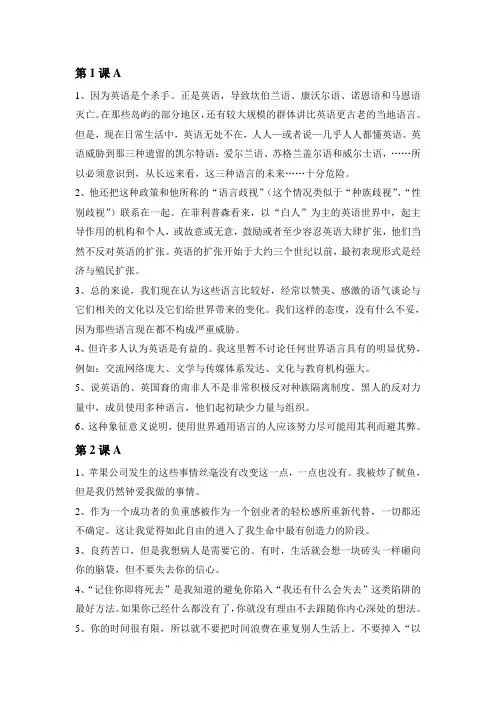
第1课A1、因为英语是个杀手。
正是英语,导致坎伯兰语、康沃尔语、诺恩语和马恩语灭亡。
在那些岛屿的部分地区,还有较大规模的群体讲比英语更古老的当地语言。
但是,现在日常生活中,英语无处不在,人人—或者说—几乎人人都懂英语。
英语威胁到那三种遗留的凯尔特语:爱尔兰语、苏格兰盖尔语和威尔士语,……所以必须意识到,从长远来看,这三种语言的未来……十分危险。
2、他还把这种政策和他所称的“语言歧视”(这个情况类似于“种族歧视”、“性别歧视”)联系在一起。
在菲利普森看来,以“白人”为主的英语世界中,起主导作用的机构和个人,或故意或无意,鼓励或者至少容忍英语大肆扩张,他们当然不反对英语的扩张。
英语的扩张开始于大约三个世纪以前,最初表现形式是经济与殖民扩张。
3、总的来说,我们现在认为这些语言比较好,经常以赞美、感激的语气谈论与它们相关的文化以及它们给世界带来的变化。
我们这样的态度,没有什么不妥,因为那些语言现在都不构成严重威胁。
4、但许多人认为英语是有益的。
我这里暂不讨论任何世界语言具有的明显优势,例如:交流网络庞大、文学与传媒体系发达、文化与教育机构强大。
5、说英语的、英国裔的南非人不是非常积极反对种族隔离制度。
黑人的反对力量中,成员使用多种语言,他们起初缺少力量与组织。
6、这种象征意义说明,使用世界通用语言的人应该努力尽可能用其利而避其弊。
第2课A1、苹果公司发生的这些事情丝毫没有改变这一点,一点也没有。
我被炒了鱿鱼,但是我仍然钟爱我做的事情。
2、作为一个成功者的负重感被作为一个创业者的轻松感所重新代替,一切都还不确定。
这让我觉得如此自由的进入了我生命中最有创造力的阶段。
3、良药苦口,但是我想病人是需要它的。
有时,生活就会想一块砖头一样砸向你的脑袋,但不要失去你的信心。
4、“记住你即将死去”是我知道的避免你陷入“我还有什么会失去”这类陷阱的最好方法。
如果你已经什么都没有了,你就没有理由不去跟随你内心深处的想法。
5、你的时间很有限,所以就不要把时间浪费在重复别人生活上。
中职英语 基础模块下册 Unit-7 课文翻译

For some people, smoking has become a daily habit. They think that smoking makes them feel happy and helps them relax. What makes things worse is that some famous actors show smoking on TV. This makes people think that smoking is cool and is a fashion of the day. Those ideas are foolish and wrong.
For some people, smoking has become a daily habit. They think that smoking makes them feel happy and helps them relax. What makes things worse is that some famous actors show smoking on TV. This makes people think that smoking is cool and is a fashion of the day. Those ideas are foolish and wrong.
In fact , smoking has many bad effects on people’s health. Cigarette smoking is dangerous and every cigarette one smokes shortens one’s life. A smoker usually lives a shorter life than a nonsmoker. In many cases, their deaths are caused by cancer—lung cancer or mouth cancer.
基础综合英语课文翻译
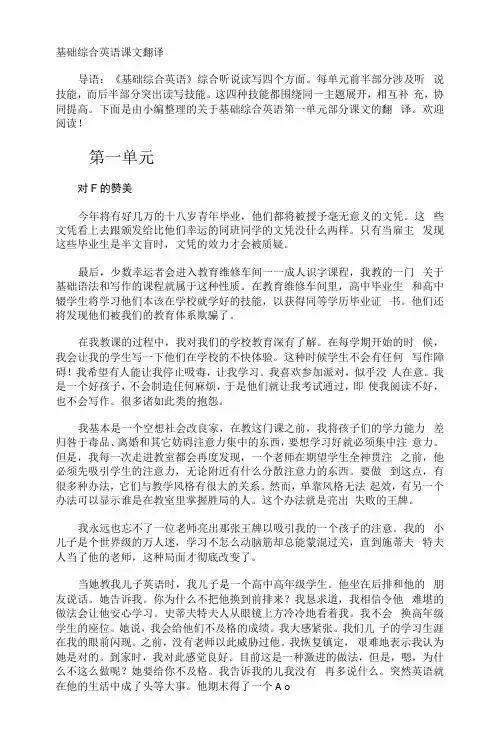
基础综合英语课文翻译导语:《基础综合英语》综合听说读写四个方面。
每单元前半部分涉及听说技能,而后半部分突出读写技能。
这四种技能都围绕同一主题展开,相互补充,协同提高。
下面是由小编整理的关于基础综合英语第一单元部分课文的翻译。
欢迎阅读!第一单元对F的赞美今年将有好几万的十八岁青年毕业,他们都将被授予毫无意义的文凭。
这些文凭看上去跟颁发给比他们幸运的同班同学的文凭没什么两样。
只有当雇主发现这些毕业生是半文盲时,文凭的效力才会被质疑。
最后,少数幸运者会进入教育维修车间一一成人识字课程,我教的一门关于基础语法和写作的课程就属于这种性质。
在教育维修车间里,高中毕业生和高中辍学生将学习他们本该在学校就学好的技能,以获得同等学历毕业证书。
他们还将发现他们被我们的教育体系欺骗了。
在我教课的过程中,我对我们的学校教育深有了解。
在每学期开始的时候,我会让我的学生写一下他们在学校的不快体验。
这种时候学生不会有任何写作障碍!我希望有人能让我停止吸毒,让我学习。
我喜欢参加派对,似乎没人在意。
我是一个好孩子,不会制造任何麻烦,于是他们就让我考试通过,即使我阅读不好,也不会写作。
很多诸如此类的抱怨。
我基本是一个空想社会改良家,在教这门课之前,我将孩子们的学力能力差归咎于毒品、离婚和其它妨碍注意力集中的东西,要想学习好就必须集中注意力。
但是,我每一次走进教室都会再度发现,一个老师在期望学生全神贯注之前,他必须先吸引学生的注意力,无论附近有什么分散注意力的东西。
要做到这点,有很多种办法,它们与教学风格有很大的关系。
然而,单靠风格无法起效,有另一个办法可以显示谁是在教室里掌握胜局的人。
这个办法就是亮出失败的王牌。
我永远也忘不了一位老师亮出那张王牌以吸引我的一个孩子的注意。
我的小儿子是个世界级的万人迷,学习不怎么动脑筋却总能蒙混过关,直到施蒂夫特夫人当了他的老师,这种局面才彻底改变了。
当她教我儿子英语时,我儿子是一个高中高年级学生。
英语课文中文翻译
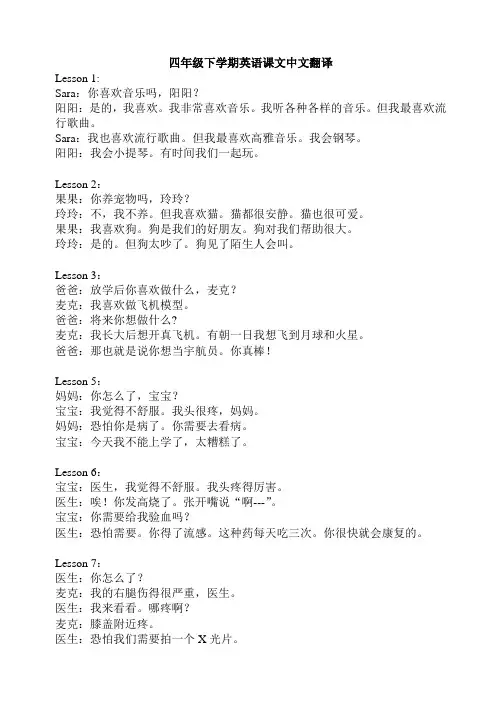
四年级下学期英语课文中文翻译Lesson 1:Sara:你喜欢音乐吗,阳阳?阳阳:是的,我喜欢。
我非常喜欢音乐。
我听各种各样的音乐。
但我最喜欢流行歌曲。
Sara:我也喜欢流行歌曲。
但我最喜欢高雅音乐。
我会钢琴。
阳阳:我会小提琴。
有时间我们一起玩。
Lesson 2:果果:你养宠物吗,玲玲?玲玲:不,我不养。
但我喜欢猫。
猫都很安静。
猫也很可爱。
果果:我喜欢狗。
狗是我们的好朋友。
狗对我们帮助很大。
玲玲:是的。
但狗太吵了。
狗见了陌生人会叫。
Lesson 3:爸爸:放学后你喜欢做什么,麦克?麦克:我喜欢做飞机模型。
爸爸:将来你想做什么?麦克:我长大后想开真飞机。
有朝一日我想飞到月球和火星。
爸爸:那也就是说你想当宇航员。
你真棒!Lesson 5:妈妈:你怎么了,宝宝?宝宝:我觉得不舒服。
我头很疼,妈妈。
妈妈:恐怕你是病了。
你需要去看病。
宝宝:今天我不能上学了,太糟糕了。
Lesson 6:宝宝:医生,我觉得不舒服。
我头疼得厉害。
医生:唉!你发高烧了。
张开嘴说“啊---”。
宝宝:你需要给我验血吗?医生:恐怕需要。
你得了流感。
这种药每天吃三次。
你很快就会康复的。
Lesson 7:医生:你怎么了?麦克:我的右腿伤得很严重,医生。
医生:我来看看。
哪疼啊?麦克:膝盖附近疼。
医生:恐怕我们需要拍一个X光片。
Lesson 9:麦克:对不起,你能告诉我去图书馆的路吗?男人:哦,好的。
就在那栋棕色楼的五层。
麦克:是在楼梯的右边还是左边呢?男人:在右边的第三个房间。
麦克:太谢谢你了。
男人;我很乐意。
Lesson 10:女人:对不起。
我正在找医院。
我怎么才能到那呢?毛毛:就在附近。
你看到那座有一个白色十字的灰色大楼了吗?女人:看到了。
在那座红色大楼的右边。
毛毛:我正好顺路。
我带你去吧。
女人:你太好了。
真谢谢你。
毛毛:不客气。
Lesson 11:女人:对不起,请问车站在哪啊?远吗?果果:不远。
继续往前开车然后左转。
你会在你的右边看见一个标志。
基础英语3课文翻译
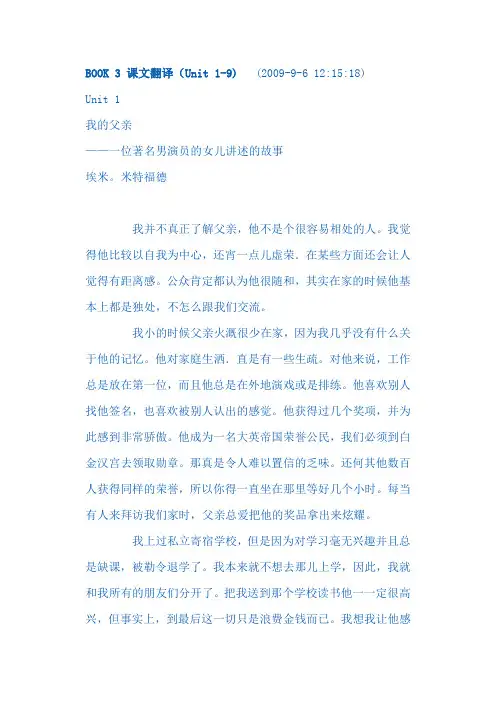
BOOK 3 课文翻译(Unit 1-9) (2009-9-6 12:15:18)Unit 1我的父亲——一位著名男演员的女儿讲述的故事埃米。
米特福德我并不真正了解父亲,他不是个很容易相处的人。
我觉得他比较以自我为中心,还宵一点儿虚荣.在某些方面还会让人觉得有距离感。
公众肯定都认为他很随和,其实在家的时候他基本上都是独处,不怎么跟我们交流。
我小的时候父亲火溉很少在家,因为我几乎没有什么关于他的记忆。
他对家庭生洒.直是有一些生疏。
对他来说,工作总是放在第一位,而且他总是在外地演戏或是排练。
他喜欢别人找他签名,也喜欢被别人认出的感觉。
他获得过几个奖项,并为此感到非常骄傲。
他成为一名大英帝国荣誉公民,我们必须到白金汉宫去领取勋章。
那真是令人难以置信的乏味。
还何其他数百人获得同样的荣誉,所以你得一直坐在那里等好几个小时。
每当有人来拜访我们家时,父亲总爱把他的奖品拿出来炫耀。
我上过私立寄宿学校,但是因为对学习毫无兴趣并且总是缺课,被勒令退学了。
我本来就不想去那儿上学,因此,我就和我所有的朋友们分开了。
把我送到那个学校读书他一一定很高兴,但事实上,到最后这一切只是浪费金钱而已。
我想我让他感到非常失望。
后来我也试着做过儿份工作;但是都不能安心长久地做下去。
然后,我意识到我真正想做的是生活在乡村照料牲畜,所以,我现在就做这个。
作为一家人,无论是情感上还是空间上我们都不那么亲密。
这些日子我们彼此很少见面。
我和父亲就像石膏和奶酪’一样完全不同。
我的兴趣一直都在乡村,而他则喜欢书本和音乐,尤其是歌剧,这恰恰是我所讨厌的。
如果他们来看我们,他们的衣着也完全不适合在乡村穿——貂皮大衣和漂亮的但不适合在田间走长路的小皮鞋。
父亲对我结婚更是完全反对。
他一直希望我和我的丈夫分开。
查拉德太卑微了,我想。
而父亲一定是怨让我嫁给一个有名望的人,但我没有。
事情就是这样。
我们夫妇俩并不打算要孩子,但是我的父亲总是不停地谈论着他想抱孙子。
研究生英语阅读教程(基础级2版)课文01及其翻译
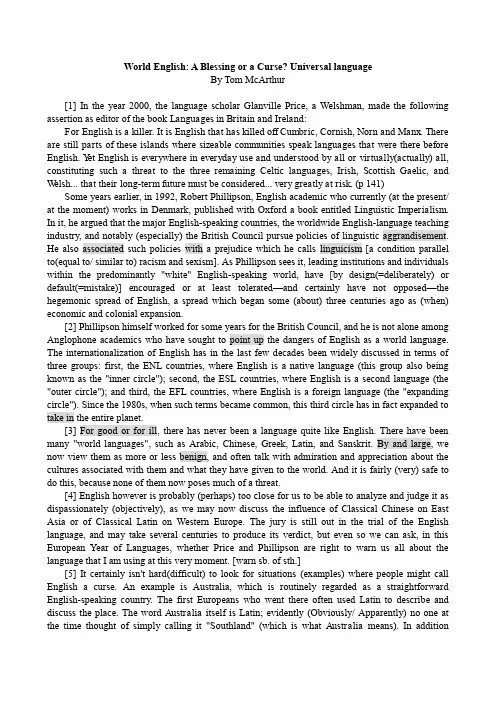
World English: A Blessing or a Curse? Universal languageBy Tom McArthur[1] In the year 2000, the language scholar Glanville Price, a Welshman, made the following assertion as editor of the book Languages in Britain and Ireland:For English is a killer. It is English that has killed off Cumbric, Cornish, Norn and Manx. There are still parts of these islands where sizeable communities speak languages that were there before English. Yet English is everywhere in everyday use and understood by all or virtually(actually) all, constituting such a threat to the three remaining Celtic languages, Irish, Scottish Gaelic, and Welsh... that their long-term future must be considered... very greatly at risk. (p 141) Some years earlier, in 1992, Robert Phillipson, English academic who currently (at the present/ at the moment) works in Denmark, published with Oxford a book entitled Linguistic Imperialism. In it, he argued that the major English-speaking countries, the worldwide English-language teaching industry, and notably (especially) the British Council pursue policies of linguistic aggrandisement. He also associated such policies with a prejudice which he calls linguicism[a condition parallel to(equal to/ similar to) racism and sexism]. As Phillipson sees it, leading institutions and individuals within the predominantly "white" English-speaking world, have [by design(=deliberately) or default(=mistake)] encouraged or at least tolerated—and certainly have not opposed—the hegemonic spread of English, a spread which began some (about) three centuries ago as (when) economic and colonial expansion.[2] Phillipson himself worked for some years for the British Council, and he is not alone among Anglophone academics who have sought to point up the dangers of English as a world language. The internationalization of English has in the last few decades been widely discussed in terms of three groups: first, the ENL countries, where English is a native language (this group also being known as the "inner circle"); second, the ESL countries, where English is a second language (the "outer circle"); and third, the EFL countries, where English is a foreign language (the "expanding circle"). Since the 1980s, when such terms became common, this third circle has in fact expanded to take in the entire planet.[3] For good or for ill, there has never been a language quite like English. There have been many "world languages", such as Arabic, Chinese, Greek, Latin, and Sanskrit. By and large, we now view them as more or less benign, and often talk with admiration and appreciation about the cultures associated with them and what they have given to the world. And it is fairly (very) safe to do this, because none of them now poses much of a threat.[4] English however is probably (perhaps) too close for us to be able to analyze and judge it as dispassionately (objectively), as we may now discuss the influence of Classical Chinese on East Asia or of Classical Latin on Western Europe. The jury is still out in the trial of the English language, and may take several centuries to produce its verdict, but even so we can ask, in this European Year of Languages, whether Price and Phillipson are right to warn us all about the language that I am using at this very moment. [warn sb. of sth.][5] It certainly isn't hard(difficult) to look for situations (examples) where people might call English a curse. An example is Australia, which is routinely regarded as a straightforward English-speaking country. The first Europeans who went there often used Latin to describe and discuss the place. The word Australia itself is Latin; evidently (Obviously/ Apparently) no one at the time thought of simply calling it "Southland" (which is what Australia means). In addition(besides), in South Australia there is a wide stretch of land called the Nullarbor Plains, the first word of which sounds Aboriginal, but nullarbor is Latin and means "no trees". And most significantly of all, the early settlers called the continent a terra nullius. According to the Encarta World English Dictionary (1999) the Latin phrase terra nullius means:... the idea and legal concept that when the first Europeans arrived in Australia the land was owned by no one and therefore open to settlement. It has been judged not to be legally valid.But that judgment was made only recently. When the Europeans arrived, Australia was thinly populated—but populated nonetheless (from then on)—from coast to coast in every direction. There were hundreds of communities and languages. Many of these languages have died out, many more are in the process of dying out, and these dead and dying languages have been largely replaced (substituted) by either kinds of pidgin English or general Australian English. Depending on your point of view, this is either a tragic loss or the price of progress.[6] At the same time, however, can the blame for the extinction of Aboriginal languages be laid specifically at the door of English? The first Europeans to discover Australia were Dutch, and their language might have become the language of colonization and settlement. Any settler language could have had the same effect. If for example the Mongols had sustained their vast Eurasian empire, Mongolian might have become a world language and gone to Australia. Again, if history had been somewhat (a little) different, today's world language might have been Arabic, a powerful language in West Asia and North Africa that currently affects many smaller languages, including Coptic and Berber. Spanish has adversely (negatively) affected indigenous languages in so-called "Latin" America, and Russian has spread from Europe to the Siberian Pacific. If English is a curse and a killer, it may only be so in the sense (meaning) that any large language is likely (possible) to influence and endanger smaller languages.[7] Yet many people see (consider/ regard) English as a blessing. Let me leave aside here the obvious advantages possessed by any world language, such as a large communicative network, a strong literary and media complex (network), and a powerful cultural and educational apparatus (organization). Let us instead look at something rather different: the issue (problem) of politics, justice, and equality. My object (target) lesson this time is South Africa. Ten years ago, South Africa ceased (stopped) to be governed on principles of racial separateness, a system known in Afrikaans (a language derived from Dutch) as apartheid. The system arose (occurred) because the Afrikaner community—European settlers of mainly Dutch descent—saw themselves as superior to the indigenous (native) people of the land they had colonized.[8] English-speaking South Africans of British descent were not particularly strong in opposing the apartheid regime (rule), and the black opposition, whose members had many languages, was at first weak and disorganized. However, the language through which this opposition gained (obtained/ got) strength and organization was English, which became for them the key language of freedom and unity, not of oppression. There are today eleven official languages in South Africa—English, Afrikaans, and nine vernacular languages that include Zulu, Ndebele, and Setswana. But which of these nine do black South Africans use (or plan to use) as their national lingua franca? Which do they wish their children to speak and write successfully (in addition to their mother tongues)? The answer is none of the above. They want English, and in particular (especially/ specifically) they want a suitably Africanized English.[9] So, a curse for the indigenous peoples of Australia and something of a blessing for those in South Africa...[10] How then should we think of English in our globalizing world with its endangered diversities? The answer, it seems to me, is crystal clear. Like many things, English is at times (often) a blessing and at times a curse—for individuals, for communities (society), for nations, and even for unions of nations. The East Asian symbolism of yin and yang might serve (illustrate) well here: There is something of yang in every yin, of yin in every yang. Although they are opposites, they belong together: in this instance (case) within the circle of communication. Such symbolism suggests (shows) that the users of the world's lingua franca should seek to benefit as fully as possible from the blessing and as far as possible avoid invoking the curse. (1, 292 words)ABOUT THE AUTHORDr. Tom McArthur is founder editor of the Oxford Companion to the English Language (1992) and the quarterly English Today: The International Review of the English Language (Cambridge, 1985—). His more than 20 published works include the Longman Lexicon of Contemporary English (1981), Worlds of Reference: Language, Lexicography and Learning from the Clay Tablet to the Computer (1986), and The English Languages (1998). He is currently Deputy Director of the Dictionary Research Center at the University of Exeter.EXERCISESI. Reading ComprehensionAnswer the following questions or complete the, following statements.1. It can be inferred from Glanville Price's statement that he is ______.A. happy that English is everywhere in Britain and IrelandB. worried about the future of the remaining Celtic languagesC. shocked by the diversity of languages in Britain and IrelandD. amazed that many people in the UK still speak their Aboriginal languages2. Cumbric is used as an example of ______.A. a local dialectB. a victim of the English languageC. a language that is on the verge of extinctionD. a language that is used by only a limited number of people3. Which of the following is the major concern of the book Linguistic Imperialism?A. English teaching overseas.B. British government's language policies.C. Dominance of English over other languages.D. The role of English in technology advancement.4. Both Price and Phillipson are ______.A. government officialsB. advocates of linguistic imperialismC. in support of language policies carried out by the British CouncilD. concerned about the negative effect of English on smaller languages5. According to the text, the EFL countries ______.A. are large in numberB. is known as the "outer circle"C. will be endangered by EnglishD. have made English their official language6. According to McArthur, Chinese is different from English in that ______.A. it has made a great contribution to the worldB. it has had positive influence on other languagesC. it may result in the disappearance of other languagesD. it probably will not endanger the existence of other languages7. When he said the jury is out in the trial" (Line 3, Paragraph 4), McArthur meant ______.A. punishment is dueB. the jury is waiting for a trialC. no decision has been made yetD. there is no one to make the decision8. Australia might be used as an example to show that ______.A. languages are changing all the timeB. some English words are derived from LatinC. English has promoted the progress of some nationsD. English should be blamed for the extinction of smaller languages9. Many people see English as a blessing for people in ______.A. AustraliaB. East AsiaC. South AfricaD. ESL countries10. The main theme of this speech is that ______.A. English should be taught worldwideB. English as a world language does more harm than goodC. we should be objective to the internationalization of EnglishD. we should be aware of (realize) the danger of English as a world languageB. Questions on global understanding and logical structures1. Why does McArthur introduce Glanville Price and Robert Phillipson's points of view on the spread of English? What is his? Intention?McArthur quotes Price’s assertion and cites Pillipson’s viewpoint on the spread of English as sort of cons to initiate his argument. Cons are usually popularly believed arguments or opinions that are against the author’s point of view. Cons are c ommonly used writing techniques and are often employed in order to appeal the audience and highlight the author’sviewpoint.2. Does McArthur agree with what Price and Phillipson argued? From as early as which section does McArthur show his attitude? Toward the dominance of English as a world English?No. McArthur’s opinion is different from Price and Pillipson’s arguments. He doesn’t believe that English is a killer and should be blamed for the extinction of smaller languages. He sees English as both a blessing and a curse, maybe as a blessing more than a curse. After introducing Price and Pillipson’s viewpoints, McArthur writes about his own ideas on the issue of English as a world language. From the sentence “For good or for ill, there has never been a language quite like English”, we can learn that McArthur does not curse English like Price and Pillipson and he has a different point of view.3. By reading "It certainly isn't hard to look for situations where people might call English a curse", could we conclude that McArthur believes English is a curse?No. This sentence is a kind of justification. Although McArthur literally justifies the fact that there are situations where people might call English a curse, he doesn’t believe that English is virtua lly a curse. By adding the word “certainly” McArthur shows his intent.4. Could you pick up some words and expressions that signal change or continuation in McArthur's thought?“For good or for ill”(paragraph 3) /“however”(paragraph 4) /“But”(paragraph 5) / “At the same time, however”(paragraph 6) /“Yet”(paragraph 7)5. How many parts can this speech be divided? How are the parts organized?Part One: paragraphs 1 and 2. These two paragraphs introduce the situation that many academics argue against English as a world language.Part Two: paragraphs 3, 4, 5, 6, 7, 8, and 9. Paragraph three is a transitional paragraph that initiates McArthur’s own argument. In these paragraphs McArthur argues that English is not only a curse as many people have believed, but a blessing as well.Part Three: paragraph 10. McArthur concludes in the last paragraph that English may be a curse or a blessing depends on different situations and we should make advantages of world languages and avoid their disadvantages.II. VocabularyA. Choose the best word from the four choices to complete each of the following sentences.1. There has been much opposition from some social groups, ______ from the farming community.A. straightforwardlyB. notably(especially)C. virtuallyD. exceptionally2. The ______ view in Britain and other Western countries associates aging with decline, dependency, isolation, and often poverty (property).A. predominantB. credulousC. inclusive(<->exclusive)D. sustainable3. But gifts such as these cannot be awarded to everybody, either by judges or by the most ___ of governments./ reward rewarding [a gifted / talented person]A. toughB. demandingC. diverseD. benign (kind)4. The foreman read the ______ of guilty fourteen times, one for each defendant.A. prejudiceB. verificationC. verdictD. punishment5. They fear it could have a(n) ______ effect on global financial markets.A. sizeableB. adverse(negative)C. beneficialD. consequential6. The UN threatened to ______ economic sanctions if the talks were broken off.A. engageB. pursueC. abandon/ abundantD. invoke7. There are at least four crucial differences between the new ______ and the old government.A. regimeB. hegemonyC. complexD. federation/ fedal<->federal, confederate)8. These questions ______ a challenge to established attitude of superiority toward the outside world.A. evolveB. constituteC. tolerateD. aroused9. Because of this, a strong administrative ______ was needed to plan the use of scarce resources, organize production and regulate distribution.A. apparatusB. constitutionC. insistenceD. promotion10. I learnt that there are no genuinely ______ animals in this area, all the animals were brought here from other places.A. endangeredB. domesticated (tamed)C. indigenousD. extinctB. Choose the hest word or expression from the list given for each Honk Use each word or expression only once and make proper changes where necessary.point up by and large take in descent for good or illleave aside crystal clear die out endanger lay... at the door of1. The book concludes with a review of the possible impact (influence) of more intimate computers for good or ill, in various areas of human life.2. Moreover, it had become clear from the opinion polls that the unpopularity of the new tax was being laid at the door of the government which had introduced it, rather than the local authorities who were responsible for levying and collecting it.3. This case gave the example of breaking someone's arm: that is a really serious injury, but one which is unlikely to endanger the victim's life.4. Many of those who hold it live in poor areas and some are Colored, that is (=i.e./ namely), of mixed European and African descent.5. This debate is important because that "the facts" are notof the conversations follow a well-worn route from one topic to the next and back again, taking in most of human life. [worn-out]7. But since agriculture forms the basis (base) of our industry, it was, by and large (on the whole), also an intensification of the crisis in the national economy in general.8. Let us factors such as education, career structure, pay and9. It is true that the exact nature of this issue is uncertain. However, one thing is crystal clear: it will not endanger the planet and its inhabitants. (habitat)10. But if animal populations are too small, then they simply die out.III. ClozeThere are ten blanks in the following passage. Read the passage carefully and choose the best answer from the four choices given for each blank. [(criterion) criteria: (1)semantic/(2)grammatical]A simplified form of the English language based on 850 key words was developed in the late 1920s by the English psychologist Charles Kay Ogden and 1 by the English educator I. A. Richards. Known as Basic English, it was used mainly to teach English to non-English-speaking persons and 2 as an international language. The complexities of English spelling and grammar, however, were major 3 to the adoption of Basic English as a second language.The fundamental principle of Basic English was that any idea, 4 complex, may be reduced to simple units of thought and expressed clearly by a limited number of everyday words. The 850-word primary vocabulary was 5 600 nouns (representing things or events), 150 adjectives (for qualities and _ 6 ), and 100 general "operational" words, mainly verbs and prepositions. Almost all the words were in 7 use in English-speaking countries. More than 60 percent of them were one-syllable words. The basic vocabulary was created 8 by eliminating numerous words which have the same or similar meanings and by 9 the use of 18 "basic" verbs, such as make, get, do, have, and be. These verbs were generally combined with prepositions, such as up, among, under, in, and forward. For example, a Basic English student would use the expression “go up”10 "ascend".1. A. created B. publicized C. invented D. operated2. A. proved B. provided C. projected D. promoted3. A. advantages B. objections C. obstacles D. facileties4. A. however B. whatever C. wherever D. whenever5. A. comprised of B. made of C. composed of D. constituted of6. A. personalities B. properties C. preferences D. perceptions/ perceive)7. A. common B. ordinary C. average D. nonprofessional8. A. in all B. at times C. for good D. in part/ partially)9. A. experiencing B. exchanging C. excluding D. extending10. A. in spite of =despite B. in favor of C. instead of D. in case ofII. TranslationPut the following passages into Chinese.1. For English is a killer. It is English that has killed off Cumbric, Cornish, Norn and Manx. There are still parts of these islands where sizeable communities speak languages that were there before English. Yet English is everywhere in everyday use and understood by all or virtually all, constituting such a threat to the three remaining Celtic languages, Irish, Scottish Gaelic, and Welsh... that their long-term future must be considered... very greatly at risk.因为英语是个杀手。
新编英语教程(基础英语)第三版第四册课文翻译Book 4 Unit 3阅读_英中对照
Unit Three第三单元电影剪辑Watch the movie clip and answer the following questions.观看电影剪辑并回答以下问题。
According to Dr. Pritchard, which two questions should be answered to determine a poem's greatness?普里查德博士认为,要决定一首诗的伟大,应该回答哪两个问题?The two questions are: One: How artfully has the objective of the poem been rendered?Two: How important is that objective?这两个问题是:第一:这首诗的目的是如何巧妙地被呈现的?第二:这个目标有多重要?Why did Mr. Keating ask his students to rip out the entire page in the book?为什么基廷先生要他的学生把书的整页撕掉?Because he wanted them to learn to think for themselves and savour words and language.因为他想让他们学会独立思考,品味词语和语言。
Discussion:讨论:Do you think it false respect to keep the books you read physically complete and undamaged?Why or why not?你认为让你阅读的书保持完整无损是错误的尊重吗?为什么或为什么不?(This is an open question.)(这是一个开放的问题。
)Script脚本(From Dead Poets Society)(来自死亡诗人协会)- Gentlemen, open your text to Page 21 of the introduction.Mr. Perry, will you read the opening paragraph of the preface entitled "Understanding Poetry"?-先生们,把你们的文章翻到引言的第21页。
职业高中英语基础模块 课文翻译
中等职业教育课程改革
上册基础,基础模块
Unit9课文翻译
有益的教诲
曾经有一个脾气不好的小男孩。
他经常和他的朋友们打架。
有一天他的爸爸给了他一带钉子,告诉他每次发脾气的时候就把一颗钉子钉在篱笆上。
这个男孩听了爸爸的话,照他爸爸说的做了。
第一天,这个男孩把17颗钉子钉到篱笆上。
后来的这些天,钉子的数量越来越少了。
这个男孩发现控制自己的脾气比王、往篱笆上面钉钉子容易。
终于有一天,这个男孩一点脾气也不发了。
他把这件事情告诉他爸爸,他爸爸让他每次控制住自己的脾气时拔下一颗钉子。
一天天过去了,这个小伙子最后终于能够告诉他爸爸所有钉子都拔完了。
爸爸拉着儿子的手,把他带到篱笆前。
他说:“你做的很好,我的儿子。
但是你看看篱笆上的洞。
篱笆不再像原来那样了。
当你说一些气话的时候,你的坏脾气将留下像这个洞一样的伤痕。
即使你说对不起,伤痕依然在那儿。
若用语言伤害一个人,造成的伤痕和肉体上的伤痕是一样的。
朋友就是最珍贵的珠宝,他们让你笑,让你感到快乐。
所以不要伤害你的朋友。
”
从那以后,那个男孩再也没有和朋友打过架。
他学会了怎样和别人相处,而且再也没有发过脾气。
六年上册英语课文翻译
六年上册英语课文翻译六年上册英语课文翻译小学生的英语一般都是比较的简单基础的,以下是店铺整理的六年上册英语课文翻译,欢迎阅读参考!第一单元Let’s start 去一个地方有许多种方式,看这些图片。
我知道有哪些吗?让我想想。
首页:你怎样去上学?我步行去上学。
我骑自行车去上学。
我怎样才能到动物园?你可以乘地铁去。
我怎样才能到自然公园?你可以坐12路公共汽车去。
A部分Let’s learn 你怎样去上学?我骑自行车去上学。
你怎样去加拿大?我乘飞机去。
乘飞机坐轮船步行骑自行车坐公共汽车乘火车乘地铁Let’s play 你怎样去上学?我步行去上学。
你怎样去美国?我乘飞机去。
Let’s talk莎朗,你怎样去上学?我家很近。
我通常步行去上学。
有时候我骑车去,你呢?我通常乘公共汽车去上学。
Group work你怎样去上学?我通常步行去上学,因为我家很近。
你怎样去上学?我通常乘公共汽车去上学,因为它快。
Let’s read 莎朗,今天下午我们去公园吧。
太好了!介是我们怎样去呢?太简单了。
你骑自行车来我家。
我们可以步行车站。
然后我们乘公共汽车去公园。
好吧。
介是你家在哪儿?我家在邮局附近。
哪一层?第五层,5A房间。
好的!今天下午,两点见。
到时候见!B部分Let’s learn看交通灯。
记住交通规则!红灯停。
黄灯等。
绿灯行。
Let’s talk我怎样能到中山公园?你可以乘15路公共汽车。
我可以步行吗?当然,如果你愿意。
那儿不远。
Let’s read 看并且找出不同之处。
交通灯在每个国家都一样。
总是有三种灯:红、黄和绿。
红是“停”黄是“等”,绿是“行”。
在中国,司机在路的右边行驶。
在美国,司机也在路的右边行驶。
然而,在英国和澳大利亚,司机在咱的左边行驶。
如果你乘公共汽车,骑自行车或步行,你必须知道交通规则。
C部分Pronunciation 山峰打对处理猪大的罐子盘子Read and match 菜海滩大头针茶Good to know 1.人行横道 2.右转弯 3.单行道 4.禁止驶入 5.自行车禁行 6.禁止左转故事时间:这儿有15美元,我们去快餐店吃午饭吧。
基础英语4课文翻译1-8
Unit 1 Never Give In,Never, Never, Never 绝不屈服,绝不,绝不,绝不Winston Churchill 温斯顿·丘吉尔Almost a year has passed since I came down here at your Head Master’s kind invitation in order to cheer myself and cheer the hearts of a few of my friends by singing some of our own songs. The ten months that have passed have seen very terrible catastrophic events in the world-ups and downs, misfortunes—but can anyone sitting here this afternoon, this October afternoon,not feel deeply thankful for what has happened in the time that has passed and for the very great improvement in the position of our country and of our home?Why, when I was here last time we were quite alone,desperately alone, and we had been so for five or six months. We were poorly armed。
We are not so poorly armed today; but then we were very poorly armed。
- 1、下载文档前请自行甄别文档内容的完整性,平台不提供额外的编辑、内容补充、找答案等附加服务。
- 2、"仅部分预览"的文档,不可在线预览部分如存在完整性等问题,可反馈申请退款(可完整预览的文档不适用该条件!)。
- 3、如文档侵犯您的权益,请联系客服反馈,我们会尽快为您处理(人工客服工作时间:9:00-18:30)。
3. Hip-hop has its roots in the African traditions of percussion and storytelling.
bac k
Unit 1
Section A
Unspoken Love IV. Trying the Translation
Direction: Translate the following sentences into Chinese.
1. Nervousness hummed in the air as students waited to play.
These cars art being produced on a large scale.
2.这颗炸弹随时都可能引爆。 (at any time)
The bomb could be set off at any time.
3.双方应遵守合同条约。(observe)
Both parts should observe the terms of a contract. The government has recently initiated a massive new house building program.
国家和人民所接受和珍爱。
bac k
Unit 3
Life in Art
Section B Direction: Translate the following sentences into English, using the words or phrases in the brackets. 1.这些车正进行大规模生产。(on a large scale)
1. He carefully observed people from all walks of life at the market fairs and in the acting roles he saw in local operas.
在集市上,张明山仔细观察各行各业的人,以及地方戏中的各种角色。
back
Unit 6
The City Symbol
IV. Trying the Translation Section A Direction: Translate the following sentences into Chinese.
1. An inspiration to millions of immigrants, this statue is a universal symbol of freedom, democracy, and diplomacy. 对成千上万的移民来说,自由女神像表达着美国人民向往自由,争
张明山的作品表现了弃恶扬善的意愿。
4. When Empress Dowager Cixi celebrated her 60th birthday, the local officer of Huishan presented a clay figurine set, Immortality Peach Gathering.
Unit 1
Unspoken Love
Section B Direction: Translate the following sentences into English, using the words or phrases in the brackets.
1. 所有的钢琴看起来都一个样。
All the pianos look alike.
学生们等待着登台演奏, 紧张的气氛在空气中弥漫。
2. ″Used piano. Suitable for beginner. $100. ″
“出售旧钢琴,适合初学者使用,价格100元。”
3. A dozen keys were defective, but enough of the main keys worked.
这台钢琴的十几个琴键都有毛病,但主要琴键依然基本完好。
4. The courage I wished on my children lifted my shoulders, placed my fingers on the keys and commanded them to move….
我希望孩子能拥有的勇气如今使我挺起胸膛,手指在琴键上自由飘动。
取民主,渴望外交的理想。 2. By living in Paris as the American ambassador, Benjamin cultivated a relationship with the French government and the French people. 在巴黎居住的那段时间,作为美国大使,他就和法国政府和法国人民 培养了感情。 3. As a result, French soldiers fought alongside the American colonists.
2. Door-god Jiang is one of Zhang's most representative clay figurines.
彩塑泥人《蒋门神》是他的代表作。
3. Zhang's clay figurines show his intention of forsaking evil and promoting virtue.
了这个美妙绝伦的建筑物。
5. Nearly a century after her dedication, Lady Liberty began to 到达美洲之后过了将近一个世纪,自由女神像就开始腐蚀了。 deteriorate.
bac k
Unit 6
Section B
The City Symbol
4.政府最近开始实施一项新的浩大的建房方案。(initiate)
5.一份调查问卷有500人作答,是否能真正代表全国人民的意见? (representative of)
Is a questionnaire answered by 500 people truly representative of national opinion?
5. Lessons in music or lessons in courage, I′m not sure which I’m learning more.学到的是音乐还是勇气,哪一个更多一些,我难以确定。
bac k
Unit 3
Life in Art
IV. Trying the Translation Section A Direction: Translate the following sentences into Chinese.
在慈禧太后六十大寿时,地方官把一套大型手捏戏文泥人《蟠桃会》供奉内廷。
5. It has been introduced abroad as a cultural envoy between China and foreign countries, and has been widely accepted and appreciated by China's foreign friends. 泥塑艺术早已走出国门,成为中外文化交流的使者,为越来越多的
4. 听到敲门声时,我正在看球赛。(when)
I was watching a football match when I heard the knock.
5. 我的任务就是在星期五之前完成论文。(My task is to…)
My task is to finish the paper by Friday.
bac k
Unit 4
Hip-Hop Culture
IV. Trying the Translation
Section A Direction: Translate the following sentences into Chinese. 1. Whatever your opinion of hip-hop music may be, there is no denying it has impacted pop culture around the world, and shows no signs of slowing down.
于是,法国士兵也加入了驱赶美国殖民者的战争队伍中。
bac k
Unit 6
The City Symbol
4. The Statue of Liberty was dedicated on October 28, 1886, and Pபைடு நூலகம்esident Grover Cleveland accepted the statue on behalf of 1886年10月28日,格罗弗·克利夫兰总统代表美国人民接过 the American people.
Direction: Translate the following sentences into English, using the words or phrases in the brackets. 1.她被命名为本年度的体坛明星 。 (designate )
一度被视为昙花一现的嘻哈风,却决心继续走他的创造与赞美之路,带领更多的 归附者上路。
back
Unit 4
Section B
Hip-Hop Culture
Direction: Translate the following sentences into English, using the words or phrases in the brackets. 1.飞机失去控制,不停地旋转。 (spin, out of control) The plane was spinning out of control. 2. 这一特殊风俗起源于非洲。 (has its origins in) This particular custom has its origins in Africa. 3. 演员们的热情鼓舞着孩子们。 (inspire) The actors’ enthusiasm inspired the kids. 4. 工厂倒闭时,她和其他成百上千的人一样失去了工作。 (along with) She lost her job when the factory closed, along with hundreds of others. 5. 他将自己的成功归因于努力工作。 (attribute …to) He attributes his success to hard work.
